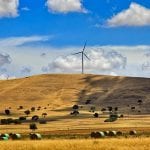Around The Web
Total solar eclipse 2019: South America awaits sky show
Sydney man injured in suspected shark attack at Manly beach
Northern beaches local was swimming with friends at Shelly beach about 6am when he thought he was bitten
Sydney’s famous Manly beach has been closed after a man was injured in a suspected shark attack during an early-morning swim.
The local – believed to be in his mid-50s – was swimming with friends at the adjoining Shelly Beach about 6am on Tuesday when he thought he was bitten. He managed to swim to nearby rocks and raise the alarm.
Continue reading...CP Daily: Monday July 1, 2019
States doing heavy lifting on renewables, but NSW and Queensland lag behind
 Green Energy Markets counts 10,000MW of new renewables under construction in Australia – thanks largely to state government policies – but the bigger states lag behind the pace.
Green Energy Markets counts 10,000MW of new renewables under construction in Australia – thanks largely to state government policies – but the bigger states lag behind the pace.
The post States doing heavy lifting on renewables, but NSW and Queensland lag behind appeared first on RenewEconomy.
'Football pitch' of Amazon forest lost every minute
Rise in population of crows and avian predators linked to pheasant shoots
Call for ecological impact assessment of huge numbers of non-native gamebirds released in UK by shooting industry
Large-scale pheasant and partridge shoots are boosting the populations of avian predators including crows, jays, ravens and buzzards, which are feeding on millions of the non-native gamebirds, according to a new study.
Despite gamekeepers legally trapping and shooting many avian predators to protect pheasants and partridges, researchers found “multiple positive associations” between areas of lowland Britain with large numbers of reared pheasants and partridges and higher populations of avian predators.
Continue reading...Romania poised to shift from free EUA allocations towards Modernisation Fund use post-2020
Oregon governor may explore executive action for future carbon market
'The focus is on education': New Zealand's plastic bag ban comes into effect
Nearly two dozen new California CITSS accounts opened during Q2 for WCI programme
Australia won't reach Paris target without action on transport, LNG and coal, expert says
Morrison government urged to address where greenhouse gas emissions are rising substantially
The challenge the Morrison government faces in meeting future climate targets without new policies is underlined by an analysis that breaks down how significantly greenhouse gas emissions are increasing from transport, natural gas and coalmining.
Since 2005, the year against which the government has chosen to benchmark its Paris target, Australia’s emissions from transport are up 23%.
Continue reading...Loss of biodiversity from our gardens | Letters
I feel for readers who have been missing birds and bats in their gardens (Letters, 28 June). I can’t be sure of the reasons – climate change could, of course, be a factor – but I would like to ascribe the continued presence of both in my garden to the fact that I have never used chemical or other means to get rid of insects. My lack of gardening rigour has meant the garden is slightly messy, so various forms of wildlife have been able find places to live. A hedgehog, badger and fox have all been sighted, and we have often heard, although never seen, a tawny owl.
Cherry Weston
Wolverhampton
• Digging patches of my garden over the last few months, I haven’t seen a single worm. Seems odd.
Dr Nigel Mellor
Newcastle upon Tyne
EXCLUSIVE: Oregon ETS bill would have created inequalities, says swing Democrat Senator
Night King: Australia bee fly named after Game of Thrones villain
EU Midday Market Brief
'It's getting warmer, wetter, wilder': the Arctic town heating faster than anywhere
In the world’s northernmost town, temperatures have risen by 4C, devastating homes, wildlife and even the cemetery. Will the rest of the planet heed its warning?
Continue reading...Police use pepper spray on seated climate protesters in Paris – video
Police try to disperse young protesters, who blocked traffic on Paris roads on Friday to call for more government action and media attention on climate change. About 400 demonstrators, many of them students, blocked traffic on Pont de Sully in central Paris. In an effort to stop the sit-in, police dragged and carried away protesters, arresting some of them
Continue reading...French police criticised for using pepper spray on climate protesters
Video showing police removing seated demonstrators in Paris causes outrage on social media
France’s interior minister has asked the Paris police chief to explain a controversial riot police operation to remove climate activists from a bridge, after a video of officers using pepper spray and dragging protesters went viral on social media.
The interior ministry said the police operation to clear the demonstrators was “necessary to restore traffic circulation in the centre of Paris”.
Continue reading...Australia’s ERF cancels carbon credit contracts from coal mine waste
More than a dozen seabird species in decline off south-east Australia, study finds
The findings are ‘worrying’, researchers say, and are likely to be partly because of warming ocean temperatures
More than a dozen species of seabirds are in decline off Australia’s south-east coast – likely because of warming ocean temperatures, new research has found.
The study revealed sightings of almost half of the 30 most abundant seabirds – including the wandering albatross and flesh-footed shearwater – had fallen in the region between 2000 and 2016.
Continue reading...


